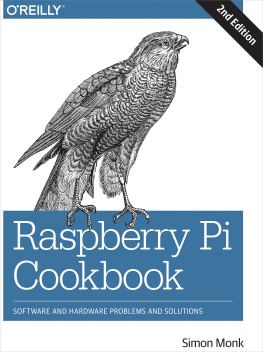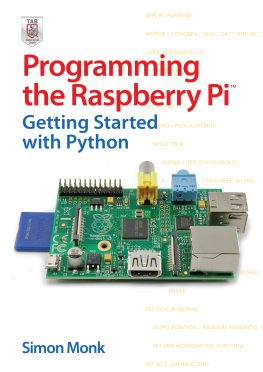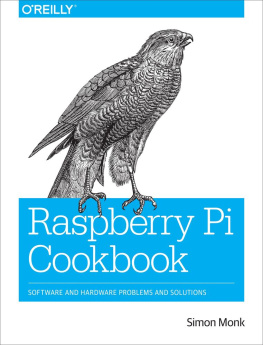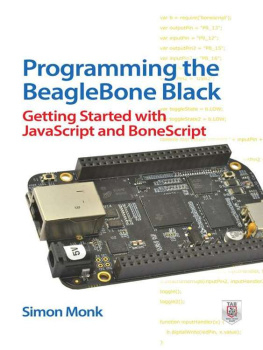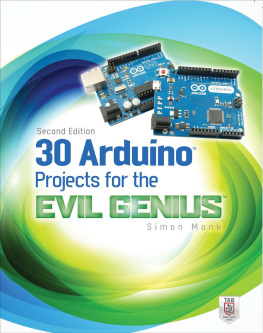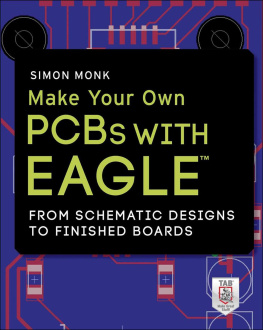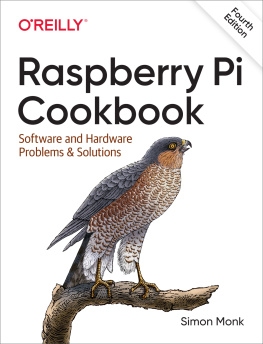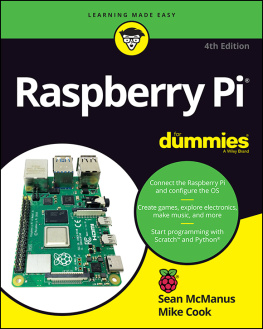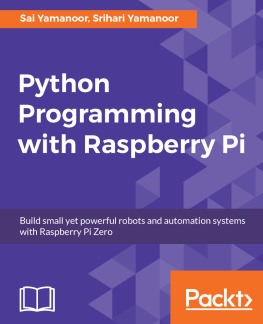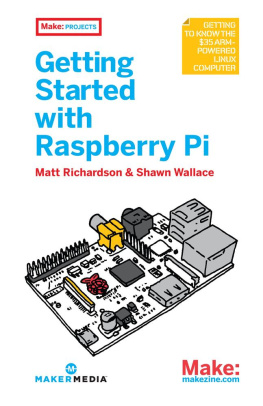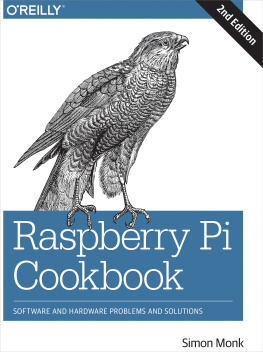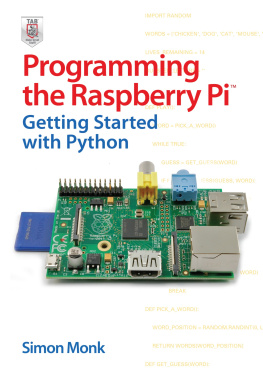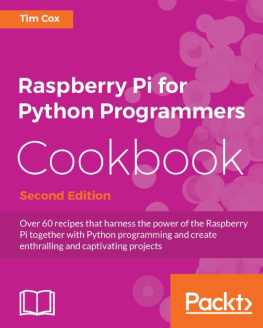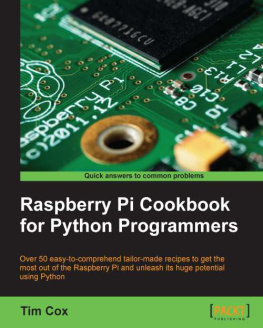Raspberry Pi Cookbook
by Simon Monk
Copyright 2016 Simon Monk. All rights reserved.
Printed in the United States of America.
Published by OReilly Media, Inc. , 1005 Gravenstein Highway North, Sebastopol, CA 95472.
OReilly books may be purchased for educational, business, or sales promotional use. Online editions are also available for most titles (http://safaribooksonline.com). For more information, contact our corporate/institutional sales department: 800-998-9938 or corporate@oreilly.com .
- Editors: Susan Conant and Jeff Bleiel
- Production Editor: Kristen Brown
- Copyeditor: Nan Reinhardt
- Proofreader: Gillian McGarvey
- Indexer: Judy McConville
- Interior Designer: David Futato
- Cover Designer: Karen Montgomery
- Illustrator: Rebecca Demarest
- August 2014: First Edition
- June 2016: Second Edition
Revision History for the Second Edition
See http://oreilly.com/catalog/errata.csp?isbn=9781491939109 for release details.
The OReilly logo is a registered trademark of OReilly Media, Inc. Raspberry Pi Cookbook, the cover image, and related trade dress are trademarks of OReilly Media, Inc.
While the publisher and the author have used good faith efforts to ensure that the information and instructions contained in this work are accurate, the publisher and the author disclaim all responsibility for errors or omissions, including without limitation responsibility for damages resulting from the use of or reliance on this work. Use of the information and instructions contained in this work is at your own risk. If any code samples or other technology this work contains or describes is subject to open source licenses or the intellectual property rights of others, it is your responsibility to ensure that your use thereof complies with such licenses and/or rights.
978-1-491-93910-9
[LSI]
Preface to the Second Edition
Launched in 2011, the Raspberry Pi has found a role both as a very low-cost Linux-based computer and as a platform for embedded computing. It has proven popular with educators and hobbyists alike.
Since the first edition of this book, several million more Raspberry Pis have been sold and a number of new models of Raspberry Pi have been produced. Some modelslike the models B+, A+, and Pi 2 model B+improve the specification of this device, culminating in the Raspberry Pi 2 with quad-core processor and the Raspberry Pi Compute model, which provide the Raspberry Pi as a plugin board that can become part of a larger system.
This edition has been thoroughly updated to encompass the new models of Raspberry Pi, as well as the many changes and improvements to its Raspbian operating system.
This edition contains a new chapter on computer vision and a chapter of recipes on making Internet of Things projects with your Raspberry Pi.
This book is designed in such a way that you can read it linearly as you would a regular book, or access recipes at random. You can search the table of contents or index for the recipe that you want and then jump right to it. If the recipe requires you to know about other things, it will refer you to other recipes, rather like a cookbook might refer you to base sauces before showing you how to cook something fancier.
The world of Raspberry Pi moves quickly. With a large, active community, new interface boards and software libraries are being developed all the time. In addition to examples that use specific interface boards or software, the book also covers basic principles so that you can have a better understanding of how to use new technologies that come along as the Raspberry Pi ecosystem develops.
As you would expect, a large body of code (mostly Python programs) accompanies the book. These programs are all open source and available on GitHub. Youll find a link to them at the Raspberry Pi Cookbook website.
For most of the software-based recipes, all you need is a Raspberry Pi. I recommend a Raspberry Pi 2 or 3. When it comes to recipes that involve making your own hardware to interface with the Raspberry Pi, I have tried to make good use of ready-made modules, as well as solderless breadboard and jumper wires to avoid the need for soldering .
For those wishing to make breadboard-based projects more durable, I suggest using prototyping boards with the same layout as a half-sized breadboard, such as those sold by Adafruit, so that the design can easily be transferred to a soldered solution.
Conventions Used in This Book
The following typographical conventions are used in this book:
ItalicIndicates new terms, URLs, email addresses, filenames, and file extensions.
Constant widthUsed for program listings, as well as within paragraphs to refer to program elements such as variable or function names, databases, data types, environment variables, statements, and keywords.
Constant width boldShows commands or other text that should be typed literally by the user.
Constant width italicShows text that should be replaced with user-supplied values or by values determined by context.
Tip
This icon signifies a tip, suggestion, or general note.
Warning
This icon indicates a warning or caution.
Note
This icon points you to the related video for that section.
Using Code Examples
Supplemental material (code examples, exercises, etc.) is available for download at http://www.raspberrypicookbook.com.
This book is here to help you get your job done. In general, if example code is offered with this book, you may use it in your programs and documentation. You do not need to contact us for permission unless youre reproducing a significant portion of the code. For example, writing a program that uses several chunks of code from this book does not require permission. Selling or distributing a CD-ROM of examples from OReilly books does require permission. Answering a question by citing this book and quoting example code does not require permission. Incorporating a significant amount of example code from this book into your products documentation does require permission.
We appreciate, but do not require, attribution. An attribution usually includes the title, author, publisher, and ISBN. For example: Raspberry Pi Cookbook, Second Edition, by Simon Monk (OReilly). Copyright 2016 Simon Monk, 978-1-491-93910-9.
If you feel your use of code examples falls outside fair use or the permission given above, feel free to contact us at .
Safari Books Online
Note
Safari Books Online is an on-demand digital library that delivers expert content in both book and video form from the worlds leading authors in technology and business.
Technology professionals, software developers, web designers, and business and creative professionals use Safari Books Online as their primary resource for research, problem solving, learning, and certification training.
Safari Books Online offers a range of plans and pricing for enterprise, government, education, and individuals.
Members have access to thousands of books, training videos, and prepublication manuscripts in one fully searchable database from publishers like OReilly Media, Prentice Hall Professional, Addison-Wesley Professional, Microsoft Press, Sams, Que, Peachpit Press, Focal Press, Cisco Press, John Wiley & Sons, Syngress, Morgan Kaufmann, IBM Redbooks, Packt, Adobe Press, FT Press, Apress, Manning, New Riders, McGraw-Hill, Jones & Bartlett, Course Technology, and hundreds more. For more information about Safari Books Online, please visit us online.

